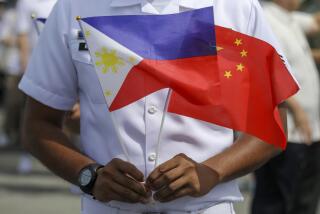Philippines, Muslim Rebels Reach Accord
- Share via
MANILA — The government of President Corazon Aquino and the head of the Philippines’ leading Muslim secessionist movement agreed Sunday to a process intended to end 14 years of civil war that has killed 60,000 people in the south.
The Moro National Liberation Front dropped its longstanding demand for complete independence from the Philippines and signed two agreements with a government negotiating team that will allow residents of five southern islands to vote on whether they want autonomy from the central government.
The agreement, reached during negotiations in Jidda, Saudi Arabia, is an important victory for Aquino’s efforts to negotiate settlements to insurgencies plaguing this scattered archipelago.
Aquino’s government and rebels of the Communist New People’s Army are preparing to begin substantive negotiations Tuesday aimed at ending the 18-year-old Marxist rebellion in the Philippines. A cease-fire between the government and the Communist insurgents has been in effect since Dec. 10.
Government negotiators, headed by Aquino’s brother-in-law, Agapito Aquino, reached the accord with the Muslim secessionist movement after a day of talks with Nur Misuari, leader of the fron1949048948secessionist organizations.
The talks were held at the Jidda headquarters of the Organization of the Islamic Conference, which has tried for years to mediate the conflict.
The Moro National Liberation Front “has scaled down their request from independence to autonomy,” Agapito Aquino said. “This is the first time they have agreed to autonomy.”
Misuari said, “For the sake of peace and for the sake of all other reasons, we had to exercise some flexibility despite the demands of the people. The people were clamoring for independence, because they believed that was the only solution to the internal problems of Mindanao.”
He added, “My demand for independence would not be wise any more because the Philippine government is going to do something to satisfy the demands of the people.”
Misuari and Aquino spoke by telephone from Jidda shortly after Sunday’s final meeting there.
Of the Philippine population of 55 million, an estimated 5 million are Muslims, concentrated in the Mindanao region. The Muslim secessionist movement there began in the 1960s, partly as a reaction to an influx of Christian settlers from Luzon and the Viscayas Islands to the north.
By 1972, the Muslims’ discontent flared into guerrilla war. The Organization of the Islamic Conference brokered a peace agreement between the Moro rebels and then-President Ferdinand E. Marcos in 1976, but the Muslims accused Marcos of reneging on his promises of economic development and political autonomy for the area.
Misuari agreed that Christians as well as Muslims be allowed to vote in the plebiscite on autonomy for the Mindanao region, including the islands of Mindanao, Palawan, Basilan, Tawitawi and Jolo. The detailed arrangements for holding the autonomy referendum are to be worked out by a six-member joint commission that is to meet in Manila on Feb. 9.
The Mindanao region is rich in minerals, including iron, and it produces the vast majority of the country’s pineapples, coffee and corn. But the region’s residents have long felt that their resources have been unfairly exploited by successive governments in Manila, which have failed to return funds for the economic development of the south.
Constitution’s Terms
Agapito Aquino said the autonomy agreement is consistent with limited self-rule granted to Muslims under the proposed Philippine constitution, on which Filipinos will vote Feb. 2. However, in a separate accord signed Sunday, the government negotiators agreed to ask President Aquino to nullify those provisions in the constitution dealing with Mindanao autonomy.
It was unclear Sunday whether the request to nullify parts of the constitution would impede full implementation of the peace agreement. Misuari said that without changes in the constitution, “all our exercises here in Jidda would be brought to naught, it would become an exercise in futility.” But he added that he believes President Aquino “is sincere” in wanting to address Muslim grievances.
Education, Local Laws
Agapito Aquino said the autonomy to be offered to residents of the five southern islands on a province-by-province basis would allow those provinces control of education, local laws and the judicial system.
Muslims constitute a majority in only five of the region’s 21 provinces, and he said he doubts that Christians in the Christian-dominated provinces will go along with the proposals. But Misuari said Christians, too, will back autonomy because “people have become tired of being cruelly exploited and oppressed” by the national government in faraway Manila.
More to Read
Sign up for Essential California
The most important California stories and recommendations in your inbox every morning.
You may occasionally receive promotional content from the Los Angeles Times.












